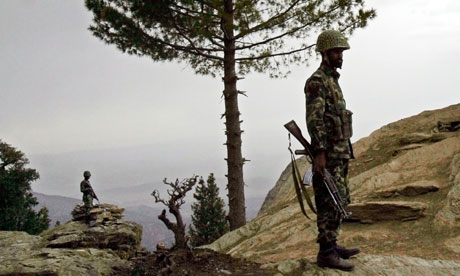Taliban owns Pakistan and soldiers abusing millions , says Amnesty International
Survey of North-West tribal belt by rights group says militants torturing and killing women, aid workers and beardless men

Pakistani soldiers monitor their side of the Afghan border in the tribal belt of North Waziristan. Photograph: Matthew Pennington/AP
Nearly 4 million Pakistanis live under Taliban rule in the north-western tribal belt, where they suffer human rights abuses from both militants and the army, Amnesty International said today.
As if Hell Fell on Me, a report based on interviews with nearly 300 people, says millions live in a "human rights free zone" where militants torture and kill women, aid workers and men without beards.
Soldiers have also committed serious violations, including indiscriminate artillery fire and extrajudicial executions, as the army swept across the tribal belt over the past year, it said.
"The Taliban have been able to assert their ideology through a combination of violence and fear," said Sam Zarifi, one of the authors. "Meanwhile the army seems focused on killing the enemy and not on protecting its own citizens."
At least 1,300 civilians died during conflict in 2009 in north-western Pakistan, an area that spans the seven agencies of the tribal belt and Khyber Pakhtunkwa province, formerly known as North-West Frontier province.
In total, 8,500 people, including soldiers and militants, were killed – a level of bloodshed comparable with Afghanistan. Another 1 million people have been displaced by the conflict. Scattered across towns and camps, their plight was being "largely ignored", Amnesty said.
The report comes days after the Taliban executed a man on a football pitch in North Waziristan, the main hub of militant activity in the tribal belt. The man had been sentenced to death for killing his two brothers in an argument.
The public show of justice was a reminder of Taliban authority in an area dominated by the al-Qaida linked warlord Jalaluddin Haqqani, and where government soldiers are largely confined to their bases.
The US wants Pakistan to extend its its anti-militant offensive to North Waziristan.
The government and its western allies must urgently devise a co-ordinated strategy that includes development and political reform, he said.
"They have to put something in place that signals to the people that they haven't been abandoned," he said.
The tribal areas have the worst social indicators of any region in Pakistan – just 3% of women are educated, by some estimates – while the area is still ruled using a draconian, colonial-era law known as the frontier crimes regulations (FCR).
The turmoil presents a rare opportunity to reform or abolish the century-old FCR, Zarifi said, partly because many of the pro-government elders who underpin the system have been killed or forced to flee.
"We need to get away from the idea that this is a crazy area with a litany of horrors, and that we need to wash our hands of it. This is the moment to act."
The report is also critical of the government's reliance on tribal militias in the Swat valley, where the army cleared the Taliban last year. The militias have little accountability and engage in extrajudicial killings, sometimes to settle old scores, it said.
Visiting Peshawar today, the British development secretary, Andrew Mitchell, announced an £8m education programme for the north-west region. He said Pakistan was facing an "education emergency", where two-thirds of women were illiterate.
Under the scheme, 300,000 schoolgirls will be paid an allowance to attend school, and more than 3 million children will receive free textbooks.
No comments:
Post a Comment